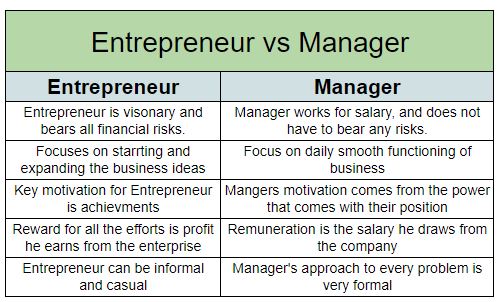Manager vs Entrepreneurs in the Consulting firm
 Most companies would like their managers to take on more responsibility, help with the company’s top line and take ownership of what they deliver, in essence wanting them to be entrepreneurial within the structure of the organization. Several factors differentiate an entrepreneur from a corporate manager. The differences between the two can help develop an organizational structure that makes managers more entrepreneurial within the organization. We talk more about that in future blogs in this series but this blog focuses on the key differences:
Most companies would like their managers to take on more responsibility, help with the company’s top line and take ownership of what they deliver, in essence wanting them to be entrepreneurial within the structure of the organization. Several factors differentiate an entrepreneur from a corporate manager. The differences between the two can help develop an organizational structure that makes managers more entrepreneurial within the organization. We talk more about that in future blogs in this series but this blog focuses on the key differences:
Primary Motivation:
Managers are looking for promotions whereas entrepreneurs are looking for freedom. They can get freedom through control over their time, by getting more money or gaining more power but it is freedom they primarily seek.
Delegation Orientation
Manager’s job is generally to make sure ‘things get done’ so the most of their day is spent delegating work, tracking its progress etc. Entreprenuers find this a tedious task and generally shy away from it or worse (dive in and try to do it themselves).
Skills
Manager skills are usually geared towards efficient management of people, political structures etc to achieve defined goals. Entrepreneurs generally understand the business as a whole. They usually come from technical backgrounds and sometimes have had experiences running departments or practice areas.
Locus of control
Locus of control refers to the degree to which a person feels that he has control over things in his life. Managers usually have an external locus of control i.e. they feel others (usually their superiors) are responsible for their destiny. Entreprenuers on the other hand usually have a strong internal locus of control and feel that ultimately /they have control over what goes on in their lives. They are usually self-confident, and optimistic about the future. For the same reason, you will usually find them to be against the system.
Risk
Managers are usually raised to consider risk to be a bad thing and the job of the manager generally revolves around making sure all risks are mitigated. Entrepreneurial people are generally not afraid to get fired (because of their self confidence) and generally tend to be more willing to take riskier decisions.
Status Symbols
Managers generally feel a sense of pride from the corner office, the shiny building and the number of people who stand up when they walk in. Entrepreneurs will usually not weigh these heavily and focus more on what is being done rather than how it looks.
Attitude towards failure
Managers generally view failures as negative experiences whereas entrepreneurs tend to treat these are learning experiences. “Fail fast and small” is a mantra often used that describes the psycii quite well.
Decision making ability
Managers generally have a limited sphere of decision making outside of which they don’t like making decisions. Entrepreneurs like to make decisions and generally don’t like to be told what to do.
Family Histories
While this sounds a little too personal, we do see patterns here when trying to spot or hire these types. Managers will usually come from families where parents themselves were doing jobs (generally for large govt or corporate organizations). They tend to have dependents in the family. The youngest son of 3 of a small business owner is much more likely to be an entrepreneur. This is by no means a rule but a strong indicator.
Attitude towards Education
The attitude towards it is generally a significant factor. Entrepreneurs usually hold education (especially higher education like PhD) irrelevant and tend towards more ‘practical’ things whereas managers tend to view these as proofs of competence.
Future posts in this series will talk about why organizations should look to breed more entrepreneurs and how exactly to go about it.







